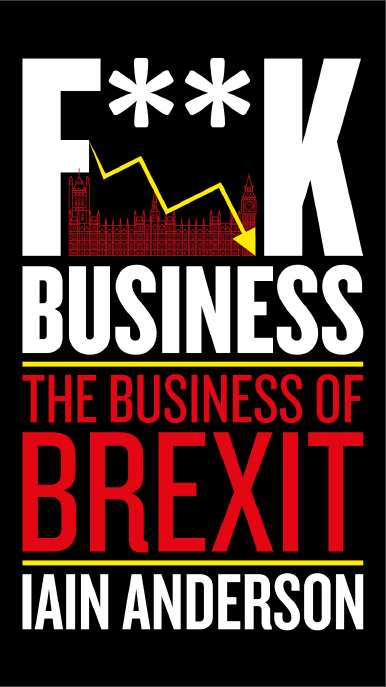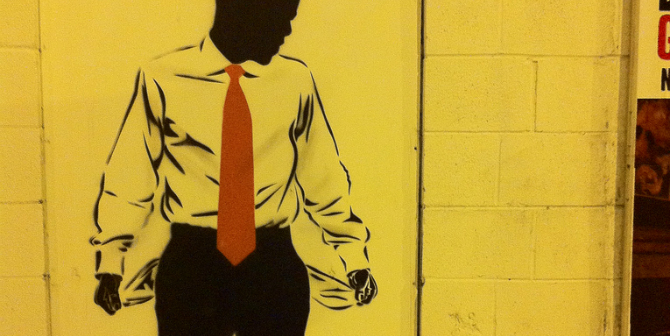Business has been f**ked! F**k government! The relationship between business and politics is broken – can it be fixed? This contribution, by Daniel Kinderman (University of Delaware), part book review and part blog post, reflects on the tense and sometimes openly conflictual relationship between business and politics in populist nationalism.
Iain Anderson’s book F**K Business: The Business of Brexit is a riveting read that sheds light on the growing antagonism between business and government in recent years. After Brexit, Anderson recalls:
…the sense of the business world – normally so articulate and composed – being all at sea, unable to find the words, exhausted by the politics and unable to work out its next steps. This feeling was to last for months ahead …. I had never seen business leaders respond with such emotion. Business is supposed to be a rational act … It is governed by making cool-headed judgments and carrying then out with care and diligence. None of these behaviors were on display in the early days and weeks after the referendum. For some, there was a sense of panic; for most, I witnessed an initial numbness, and from a few there was real anger (pp. 71-72)
Anderson describes how Theresa May’s top advisors screamed at the president and director-general of the Confederation of British Industry. The president of the CBI recalls: “I had never been spoken to by that in my forty years in business. There was no respect” (p. 97). Another top-level business representative stated: “I don’t think the relationship between business and politics has been this low since the mid-1970s” (p. 116). In one revealing exchange before the referendum, an economics professor pointed out that Brexit would likely lead to a lower GDP. A woman yelled back: “That’s your bloody GDP. Not ours” (p. 114).
The disconnect between the business establishment and politics in the Brexit era is a stark contrast to the tight relationship between business and politics during the heyday of neoliberal globalization. Neoliberalism’s ‘Golden Straightjacket’ “narrow[ed] the political and economic policy choices of those in power to relatively tight parameters,” making it “increasingly difficult … to find any real differences between ruling and opposition parties.” Politics became “just political engineering to implement decisions on the narrow space allowed you within this system.” One scholar called this “Post-democracy”:
Under this model, while elections certainly exist and can change governments, public electoral debate is a tightly controlled spectacle, managed by rival teams of professional experts in the techniques of persuasion, and considering a small range of issues selected by these teams. The mass of citizens plays a passive, quiescent, even apathetic part, responding only to the signals given them. Behind this spectacle of the electoral game, politics is really shaped in private by interaction between elected governments and elites that overwhelmingly represent business interests
This era ended with the 2016 Brexit referendum, after which Prime Minister Theresa May systematically disengaged from business. May also stressed her commitment to ensuring that that prosperity and opportunity are shared, that no one is left behind, that her government would not be driven by the interests of the privileged few. Businesses were not used to be on the losing side (p. 81), let alone be excluded from decision making by the Conservative party. In late 2017, Anderson recalls that the mood was “just awful” among top business leaders. Together with Labour’s shift to the left, these developments suggest that leading politicians in both major parties recognize the necessity of a new social compromise. This represents a sea change in British politics. Similar developments in other countries suggest that advanced capitalist democracies are moving towards a post-neoliberal era.
 Towards the end of his book, Anderson asks: “Can the relationship be fixed or is it broken for good?” (p. 271-272). While he is critical of the political dysfunction of recent years and of politicians who attack companies and fail to listen to business, he also stresses that business must “be frank with itself” and “step up and recognize its own failings”: “A large part of the reason why it has been shut out of the debates in the last decade is a direct result of the financial crisis, excessive executive pay and the impact of austerity” (p. 275; p. 277). To move beyond the current impasse, commerce must “come up with solutions that reflect political realities” and embrace a more long-term approach, “a way of doing business that genuinely supports the communities in which firms operate” (p. 275).
Towards the end of his book, Anderson asks: “Can the relationship be fixed or is it broken for good?” (p. 271-272). While he is critical of the political dysfunction of recent years and of politicians who attack companies and fail to listen to business, he also stresses that business must “be frank with itself” and “step up and recognize its own failings”: “A large part of the reason why it has been shut out of the debates in the last decade is a direct result of the financial crisis, excessive executive pay and the impact of austerity” (p. 275; p. 277). To move beyond the current impasse, commerce must “come up with solutions that reflect political realities” and embrace a more long-term approach, “a way of doing business that genuinely supports the communities in which firms operate” (p. 275).
This is very much to the point; and one of the virtues of Anderson’s book is that he recognizes that Brexit is about much more than trading relationships, market access, and communications (or the lack thereof) between business and government. In part, it reflects a deeper set of deeper underlying issues. Austerity, precarious jobs, and growing inequality have contributed to the crisis of market liberalism in rich democracies. Perhaps it is no coincidence that the two countries that have had high and growing levels of economic distress in recent decades – the UK and the US – now find themselves so dangerously polarized. To overcome this polarization, it will be necessary to address problems of social integration, both through “economic measures aimed at improving the material situation of people” as well as “a sustained symbolic politics built on national narratives that accord respect to all groups and regions within the national community.” The challenge, in other words, is not just whether politics can reset and re-establish its relations with business, it goes much deeper than that: can big business re-establish its relations with society?
There is much at stake, but what are the prospects for a new social compromise? There seems to be widespread agreement that austerity must end, and that new investments in health care, schools,vocational training and skills are necessary. Business may support strategies of inclusive growth and it may be possible to remove some barriers to inclusion in the knowledge economy. But will one nation Conservatives’ commitments to these goals and Johnson’s proposed policies be enough, given Labour’s alternative of “an irreversible shift in the balance of power and wealth in favour of working people”? How accommodative will businesses and business organizations be to these demands? Business-led campaigns could help, if business can credibly commit to supporting inclusive national identities (accommodating Somewheres and Anywheres) undergirded by a fairer socio-political compromise.
Accomplishing a new social compromise that can overcome the souring of relations and the deepening of the trenches between business and government is a daunting task. Not only will it be costly;. as Anderson points out, representing a single voice for business has become difficult, so navigating the seemingly inevitable class conflict will be challenging for both sides. While a new social settlement is needed, whether it will be sufficient to dampen, let alone overcome identity-based conflicts is far from certain. In the Brexit era, following the exhaustion of neoliberal globalization and the political compromises that supported it, instability, uncertainty, and crises are likely to persist. Anderson makes several thoughtful recommendations that may help those who wish to move forward in these uncharted waters. An open and frank dialogue between business and the electorate, which business “often goes out of its way to avoid” (p. 114), would be a start.
This post represents the views of the author and not the Brexit blog, nor the LSE. Image by Jon Worth, Some rights reserved.






